Nov 29, 2022

Tibouchina: a September bloomer now blooms in November
On the day after Thanksgiving I typed “The End” on the first draft of a novel I’ve been working on over fifteen years; the oldest file is dated in April, 2007. Back then the working title was The Yearbook. It was the story of a middle-aged woman who tries to imagine her mother’s early life, while her mother, who died young, indignantly corrects her from some version of purgatory. That misbegotten idea aborted early. Next it was going to be the story of the middle-aged woman’s life. But she resembled me, and I didn’t like her. Finally, after several years, I dropped the middle-aged woman, and wrote the story of her parents, who married in 1946 when her mother was 20 and her father 29. The title became “A Long Marriage,” and it now follows their lives, and that of their children, until 1981.
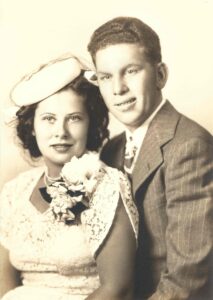
image: reddit.com
As I neared the end of the book I was exhilarated, and reported to friends and family, “Only four chapters to go.” Then on Thanksgiving, with only one scene left to write, I found myself unaccountably sad. At first I thought it was post-turkey blues, seasoned with memories of my late siblings. But that didn’t seem to fit my feelings. I was missing not my siblings, but my characters. I had spent fifteen years with them. Two were dead, and the rest really nothing but words on the page.
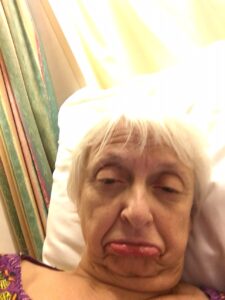
The next morning I worked a couple of hours, and typed those magical words, “The End.” I wandered around the house and yard, dazed and proud.

Tibouchina: a September bloomer now blooms in November
The glow lasted two more days. I went through the document, moving all the notes and research to separate files, formatting the remaining text, which was over 675 pages, 1.5 spaced, 235,000 words. I splurged and took it to Renaissance Printing for copying. I put it in an old 3-ring notebook from the days when I taught family law. A bookmark on the spine says “I keep my eyes on the moon, and my feet muddy.” I flipped through the pages, awed by it, awed by myself. All those words!
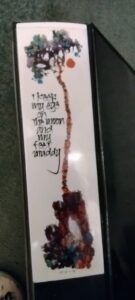
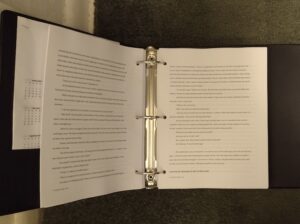
I know how much work lies ahead. (My fourth novel went through 17 drafts; at 75 I don’t think I have time for that many.) I need to get it down to about 100,000 words; nobody will publish 675 pages by an unknown writer. First I’ll figure out the arcs of the two main characters, and of the marriage.* I’ll analyze each chapter to see what it shows, asking myself what I need more or less of. If it’s too painful to ‘kill my darlings,’** I can turn them into short stories posted on my blog, whetting my vast audience’s desire for the book. (Like my vast audience, this intention is mere fantasy.)
But late last night, quailing at the huge job ahead, I remembered that the chances of my novel being accepted by a publisher are minuscule. My first three novels are set in this century and concern current issues (environmental degradation, child welfare, homelessness). I’ve only managed to get one of them published. This one is a family saga, but it begins right after World War II and goes to 1981. The family is touched by Vietnam, the women’s movement, and racial issues. The story lacks the romance of distant times or places, and I suspect that people under sixty won’t find those years very interesting, or more to the point, that agents and editors don’t believe they will.
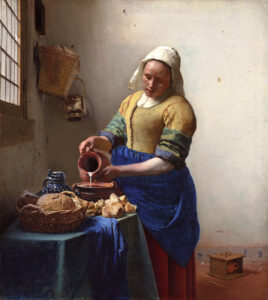
image: incrediblepaintings.blogspot.com
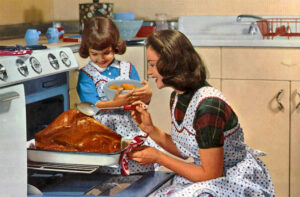
image: woodrice.com
Even as I wrote this my doubts began to dissolve. I guess I needed to get it off my chest. I certainly can’t give up now after all these years, so I’ll plunge back in. Based on past experience, it will take me a few years to have a draft worth sharing. If the audience for A Long Marriage is people my age, I guess I’d better get to work.

image: bostoncalendar.com
*I think you’re supposed to do this in an outline before you begin, but my outline consisted of a sentence or two for each of the five chunks of the book. I use the see-what’s-around-the-next-bend approach to writing, and only plan a few chapters ahead, as the ideas flow. **Stephen King famously said it, but apparently Faulkner said it first.
Feb 23, 2022
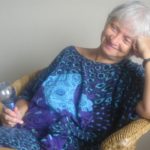
I think any writer, or anyone who must pull ideas from the depths of her (his? their? faer? zis? xyr?)* own brain, struggles, sometimes unsuccessfully, to stay on task.
My work in progress, A Long Marriage, has been going splendidly. The end of the first draft is in sight. I have a crude outline of the next few chapters of section four, and a single sentence about what will happen in the fifth and final section. I work almost every morning. On the first day of a new chapter I figure out the point of view and what will happen. I’m satisfied, knowing that the next day I will begin to write. It is in the writing phase that I struggle against distractions.
Today, as I began writing a new and distressing chapter (somebody dies), I know what to expect. The first sentence is the hardest: where to start? how to start? I close my eyes, push on the door into the void, promptly fall asleep. Wake up, make more coffee, empty the dishwasher while I wait for it to brew. Return to my chair. Where will the chapter begin? The married couple will sit at the dinner table making plans. I think about tonight’s dinner, find the new pasta recipe, look in the refrigerator for capers. Return to my chair. All of this is throat clearing, though if you attended a lecture which began with half an hour of throat-clearing you would surely leave.

Inspiration on hold
image by cottonbro at pexels
I write a first sentence. If I’m lucky, a second will follow and it will all begin to flow. I’ll end with as few as 500 words or as many as 1000, which I will read the next day, revising just a bit to get the engine started again. In a week or two I’ll have arrived at a (sometimes) satisfying conclusion to the chapter, and then I’ll be on to the next.
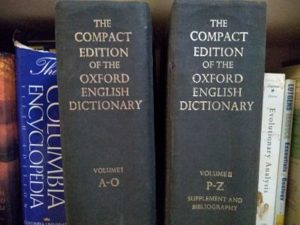
Surely I’ll find 500 words in here
I’ve been writing this blog for a dozen years, and writing fiction considerably longer. My greatest asset is my confidence that I will find what I’m looking for in the void, that distractions are part of the process, that fiddling around will eventually result in a melody that pleases me. I no longer feel desperate or anxious, I don’t castigate myself as I stumble around. And when my reluctant mind finds a new distraction, I’m amused.
The internet is of course the great distracter. Years ago I discovered the Freedom app. http://freedomto.com. I’m not sure I have the strength of character to write, or even have a fulfilling life, without it. With this app I block Facebook for twenty-two hours a day, the New York Times and my favorite games until mid-afternoon. Each morning when I start work, I block the entire internet for at least two hours. If I run into something I’d like to research, I type “RESEARCH” and leave it for later.
But when the mind is not ready to write it will find the path to avoidance, and this morning it found the path in Freedom. I went there to see how much longer I had (clock-watching is another excellent distraction) and noticed “Focus Sounds” on the left of the screen. They are supposed to help one concentrate on work. I opened that menu and to my delight saw I could listen to sounds from Coffee Shops in eleven cities around the world as well as three Office sounds with odd names (Virtucon?), five Nature sounds, six Music sounds, and five sounds from Brain.fm.**
Now, you know I had to listen to every one of them. I can report that New York coffee shops are noisier than Los Angeles coffee shops, and people in London coffee shops sound like Americans. People in offices rustle paper and cough.

I never write in coffee shops
image: lisa fotio at pexels
As for Nature, Sonoma is full of lovely birdsong, Moraine Park in Colorado has a single annoying bird, and at Beach Haven you can’t hear the surf because of a tinkling bell; I don’t believe it’s a buoy.
It was clear I wasn’t ready to go deep into this difficult chapter. I closed the document and began writing this blog post.
*Finding the list of nonbinary pronouns briefly pulled me out of the zone.
**I looked this up later. This app is supposed to help you focus or relax. The intro video says it is based in neuroscience; they’ve done large-scale experiments to see what works best. The soothing (or smug) male voice instructed me to focus on my work, and try the music for fifteen minutes in order to get “in the zone.” I think the zone is next door to Hell; after fifteen seconds I wanted to fling my laptop across the room.
image: brain.fm image: iconcom at pexels
Jan 4, 2022
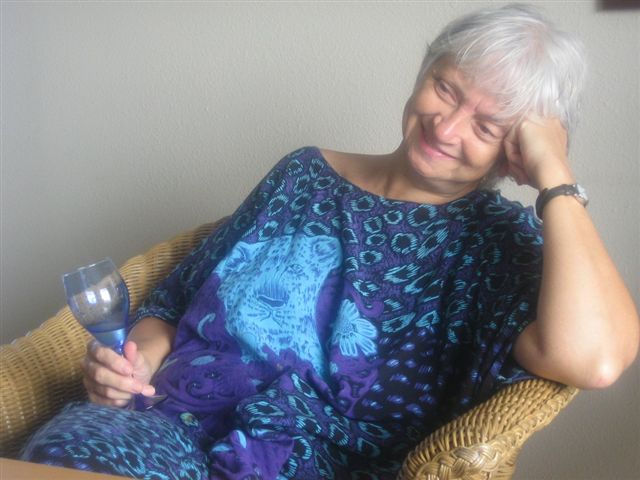
I love meeting with book clubs to discuss my first novel, Dreaming the Marsh. What author of slight renown wouldn’t love to talk with a group of people who (mostly) have read her book, people who want to discuss it and learn about the author?

Middle-aged women gathered on a porch at night posing for camera
I also love performing at nursing homes and retirement communities with my singing partner John. It was at one of these retirement communities in a nearby town that I met Phillip Johnson, the Coordinator of Entertainment and Social Activities at Halcyon Gardens.* When John told him about my novel, he eagerly asked whether I might be willing to come talk with their book club. I told him that he could check out a book club kit with ten copies of my book from the library. With a little back and forth, we set the date.
Phillip called a week before the meeting and after a few rounds of phone tag we connected. He hemmed and hawed a bit, then admitted that some of the book club members were uncomfortable with my book and didn’t want to talk with me about it. I rapidly reviewed the book in my mind. Was it the theme that opposed environmental destruction? Was it the mysterious magical elements?

bleak landscape of scattered logs with one downed tree looming in foreground. image by picography at pexels.com
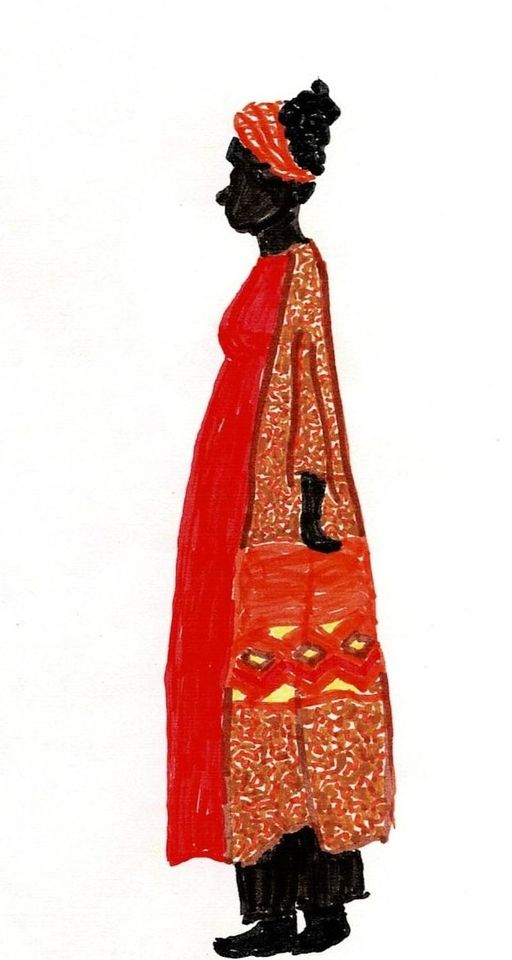
A prophet: my drawing of tall Black woman in red and orange caftan and headwrap over loose black pants
No. It was the sex. To Phillip’s relief, I laughed. I was astonished. I silently reviewed the few bits of sex in this environmental fable. I think no one would call the passages explicit or pornographic, but you can be the judge:
Randall, driving a business acquaintance back to her hotel from a dinner gathering, realizes she assumes they will have sex. “He wasn’t one for cruising bars or coming on to a woman at a party just because she was unattached. But as long as his equipment was in good working order there was no reason to pass up an invitation.” He was uncomfortable at her take-charge, businesslike approach to seduction, and “felt himself shrinking” as she sat in an armchair and watched him remove his clothes. “He was sure propinquity would do the trick; it did, and quickly. Her skin was warm and soft, and she smelled delicious. She pulled down her gown so he could reach her breasts…She was in rather a hurry, and he was a little disconcerted by her instructions on position and pace, but together they got the job done.”

woman (torso only) slips red lace gown off shoulder
Tyler falls in love with Carol. “He’d never understood other people’s obsession with sex until he began sleeping with Carol…The first time was a couple of weeks after their picnic. He plunged into her flesh, soft and warm, almost steamy, and it seemed infinite. She moved and turned under his hands. Every place she touched became in that moment the right place.” In one scene they go for a hike in the woods, and after skinny-dipping in a muddy creek, make love on the forest floor. This is the full description of the sex act: “Her skin was still cool, but inside she was warm.”

Cross Creek, Hawthorne Florida. Lush trees reflected in creek
Recalling his only previous intimate relationship he remembers that “he found Wanda’s body a pleasure and a comfort, but from the beginning their love-making was as simple and plain as bread.”
For her part, Carol recalls the excellent sex she used to have with Randall. “She could still feel every inch of him, his surprising bulk when she stretched her arms around him, crisp curly hair between her fingers, the soft skin of his side, his big tight balls banging against her.”
Jade and Jasmine are twin sisters who plan to build a condominium development in the environmentally sensitive Marsh. When they were young they dropped out of college and traveled around together for a couple of years, ending up at a communal marijuana farm. “Within a week the twins felt completely at home, part of the family. Together and separately they’d slept with every member of the commune, not excluding Lillian, the woman with the baby, whose milk dappled her nipples like dew as they caressed her breasts.”
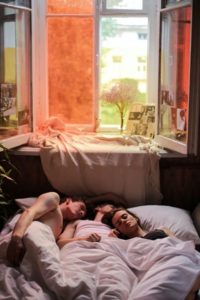
2 white men sleeping in crumpled sheets with white woman under window opened to view of tree and clouds. Image by cottonbro at pexels.com
That’s all. Six vivid but hardly explicit sex scenes in 247 pages. Halcyon has an excellent reputation, and I told Phillip that I had thought I might eventually move there, but now I wasn’t sure I would fit in and find friends. He hastened to reassure me that it was only a few members of the book group who had objected. Of course. There are over 900 residents at Halcyon; surely they come in many stripes.

image by vlada karpovich at pexels.com. bald white man blue sweater and snowy haired white woman gray sweater, hugging nose to nose
I began writing fiction over thirty years ago, and I have come to understand what I love about it. I love making stuff up. I love messing around with language, making sentences that sing. Maybe most of all, I love my characters, the creeps as well as the nice guys. By the time I have finished a novel, I understand everything about them, and to know all is to forgive all. I don’t write about sadists or other types who horrify me; I can’t spend years exploring the humanity of brutes. But I do make up people who are very different from me in their fears and insecurities, obsessions and joys.
I keep thinking about the small group of women who were offended by the sex in my book, and I start creating a character. How did she feel reading it? What memories did it stir? I want to know more about her, and I expect she will show up one of these days as a minor character in the novel I’m currently working on.
Explicit descriptions of sexual acts sound mechanistic, cliched, or simply ludicrous. But sex is such a fundamental part of being human. I can’t imagine creating a world full of people in which it doesn’t play a part.
*name and identifying information changed to protect the innocent and my new-found friend “Phillip.”
Sep 12, 2021
I have just submitted my novel, The Year of the Child, the story of a teenage mother looking for a home, to four independent traditional publishers.* In the book the search takes a year. In the story of my writing life the search has so far taken seventeen years, filled with hope rising, hope dashed, and a few thoughts of ‘Give up already,’ as well as activism, love, children and other catastrophes.
I looked for an agent for a year and a half, and miraculously found a fairly prominent one who compared me to Barbara Kingsolver and said my book would probably sell quickly. My notes of our initial conversation are filled with happy exclamation points.
😄 !!! 😄
The agent submitted to seven big corporate houses – publishers you’ve heard of – with no success. After mulling it over, she suggested that if I turned it into a YA (young adult) book – a market which in 2006 was rapidly growing – we could probably place it quickly. I mulled in my turn and sent her this:
I have thought hard about your suggestion, trying it on for size and imagining the story recast. But I’ve decided it’s not what I want to do.
As we discussed, the book is about mothers. Removing the perspective of Marybeth and Vinnie gives us a different book. I love Leanne, but she is as self-centered and naive as any fifteen-year-old. I don’t want to send her into the world alone. What I value is the combination of her viewpoint with the adults’ perspectives, as well as the interplay of the stories of mothering an infant, an adolescent, and an adult child.
I’d like to go on trying to get all three women (and their various sidekicks) in print. Although I have less time than younger writers, I suspect I have more patience. I am almost through the second draft of Seeing the Edge. As soon as I am done, I am going to read The Year of the Child aloud, and will let you know what I find.
I really want to be published. But I also hope to write better and better books, and end up with a bunch I’m proud of. I like books that I can get my teeth into, that move me and make me think, increase my understanding and puzzlement. That’s what I want to write.
Though you think I understand teenagers, I’m not sure I have any more in me. Leanne was a gift. I had an image of a girl leaving a baby by a big green dumpster. And then a few days later I heard her saying the first two sentences of the book. I would give a lot to have other characters create themselves the way she did; I rarely experience writer’s magic
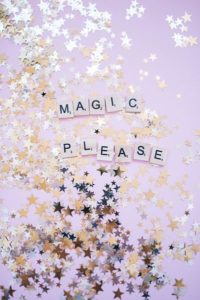
Scrabble tiles spell “magic please” with background of star stickers
Photo by Olya Kobruseva from Pexels
A couple of years went by with no success, and after fueling my determination with a quart of ice cream I called the agent and said I would try my luck with small independent publishers. These publishers usually pay small or no advances and the chances of bestsellerdom are even smaller than with the big houses, so there is little financial reward for an agent. We agreed to go our separate ways.
I met Joan Leggett of Twisted Road Publications at a panel where she and Pat Spears discussed the creation of Pat’s book, Dream Chaser. She had also published my friend Sandra Lambert’s first book, The River’s Memory. (You can find my reviews with the search icon at the top of the page)
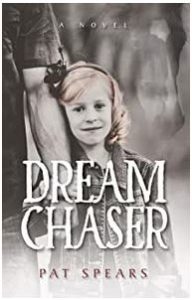
Book cover Dream Chaser: little girl holds man’s hand
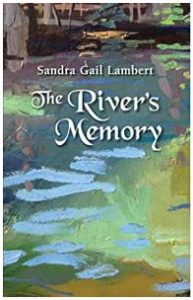
book cover The River’s Memory: painting of light-dappled narrow river filled with plants
I submitted Dreaming the Marsh to Twisted Road; Joan rejected it with a valuable two-page critique. I submitted The Year of the Child and with her guidance revised it three times, but she finally decided it wasn’t for her. Meanwhile I had revised Marsh, and she published that, then after several revisions agreed to publish Seeing the Edge.
I love working with Joan; I can’t say enough about her clear eye and sound instincts for my work. I have learned so much. But I didn’t want to give up on Child, and after reducing it from 127,000 to 99,000 words, I began my submissions elsewhere.

Woman in pink jacket, axe on shoulder, gazes up at snowy trees: no hatchet job, one word at a time
Photo by Mikhail Nilov from Pexels
It’s hard to write about the long slog toward getting published without sounding whiny. In my early years, I’m sure I whined, but I’ve long since accepted that this is how it is. I get huge happiness from my writing life: joy and pride when I’m writing well, satisfaction when I complete tangential tasks.
Seeking publication is tangential but essential. With four submissions out I’m filled with hope, Emily Dickinson’s ‘thing with feathers.’ I know perfectly well that the odds of success are miniscule and the feathers are likely to fall one by one as the rejections arrive. Meanwhile I enjoy this happy time. I indulge in wild fantasies, both serious and silly.
- Suppose two of them offer to publish it? I have already made a plan for how I will choose, and a list of the questions I’ll ask my suitors.
- What if a major independent publisher says yes, and I get more attention than I have so far? That would also promote my two other books, and the movies would come calling. Meryl Streep and Brad Pitt are perfect for the retired teacher and the homeless guy with a past in Seeing the Edge (forthcoming Fall 2022 from Twisted Road.) I don’t really know the next generation of stars, so someone else will have to cast the movies of Dreaming the Marsh and The Year of the Child.
- Would one of my nicest muumuus be appropriate for the Pulitzer ceremony?
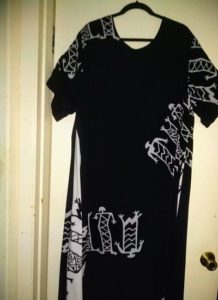
Black dress with white human figures resembling cave paintings
I have a list of about thirty publishers who are surely yearning to publish me. Each time I receive a rejection I’ll send out another submission; I want to keep that bird flying.
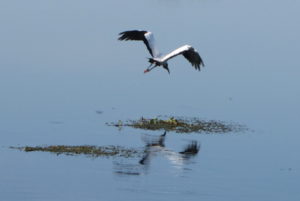
Woodstork: large white bird with black wingtips flies over marsh, only its reflection and ripples distinguish water from gray-blue sky.
Photo by Sandra Gail Lambert
* Independent – a publisher not affiliated with a large corporation or conglomerate
Traditional – publisher bears such costs as editing, cover design, production and distribution – author invests blood, sweat and tears, but no money
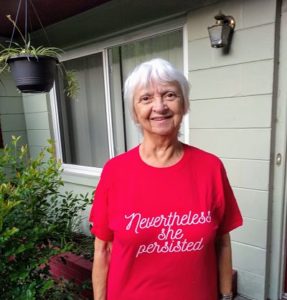
Jan 8, 2020

Four months ago, after thirty years of hoping and trying, I finally published my first novel, Dreaming the Marsh. This is for those who yearn to transition from Writer (unpublished) to Author (published). A year ago, in “Happiness,”I described the early pre-publication work: joining the Authors Guild, hiring a publicist and website designer, editing the manuscript, struggling to get blurbs. https://elizabethmccullochauthor.com/happiness/
In the months that followed, Emma, my publicist, taught me how to use Twitter, Instagram, and Goodreads. She arranged interviews on radio, TV, blogs, and print media – for an unknown author from a tiny press I had a lot of interviews. The website designers, Jennifer and Kat, guided my decisions in website design and patiently taught me how to maintain the site. Unlike many publishers, Joan Leggett consulted me on every detail of cover design. I was very pleased, until suddenly I wasn’t. I panicked and decided the cover was terribly wrong. Joan was calm and soothing; I suspect every one of her authors has a gut-wrenching panic episode before the book launch. She told me I should wait to see the ARC( advance review copy), and then we could consider changing the cover if I didn’t like it. I loved it, and many people praised it without prompting. We didn’t change the cover.
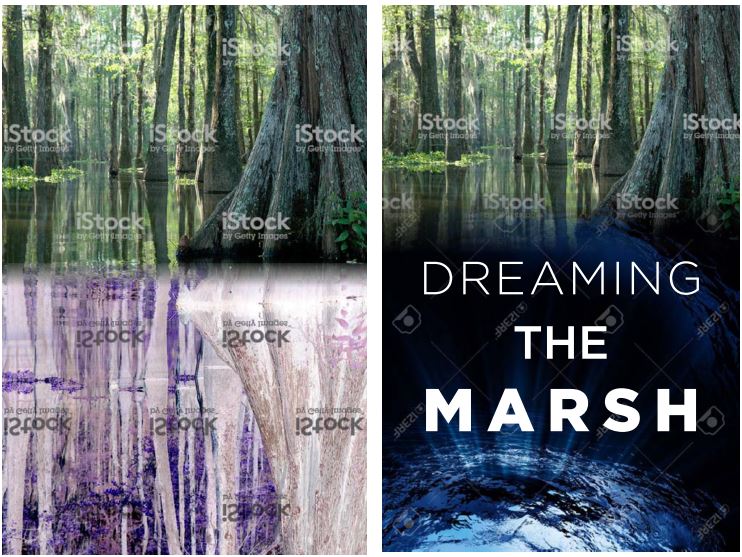
Two early cover image ideas
There has been some frustration, some anxiety, but there has been so much happiness in this year. As soon as I received the ARC, I went over to my friend’s house for a cup of tea in her garden. I handed her the book and pointed her to the dedication, which I wrote when I finished the first version, and kept secret for thirty years: “To Mary Anne Hilker, friend and first reader.”
My book launch was in September at the Matheson History Museum. My gang of friends, the Muumuus, served refreshments of homemade cookies, coffee, and lemonade. Another friend, John Polkowski, made a music mix to play before and after my talk. Sandra Lambert, my writer-friend and mentor, advised me to tell about my work as a writer, and about the book. I looked out over the audience – it filled the hall and spilled into the next room. I knew many of them, and I felt their love and support as I talked about the long years that had finally brought me to this place.
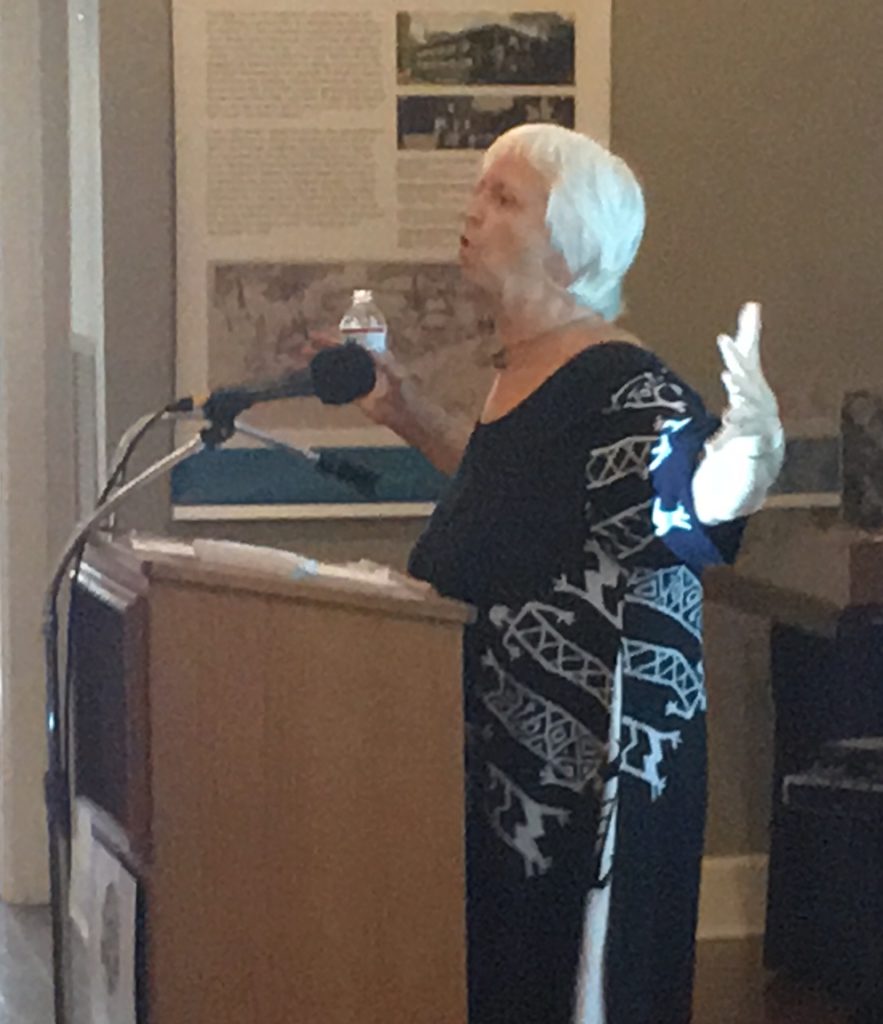
It’s Yuuuuge
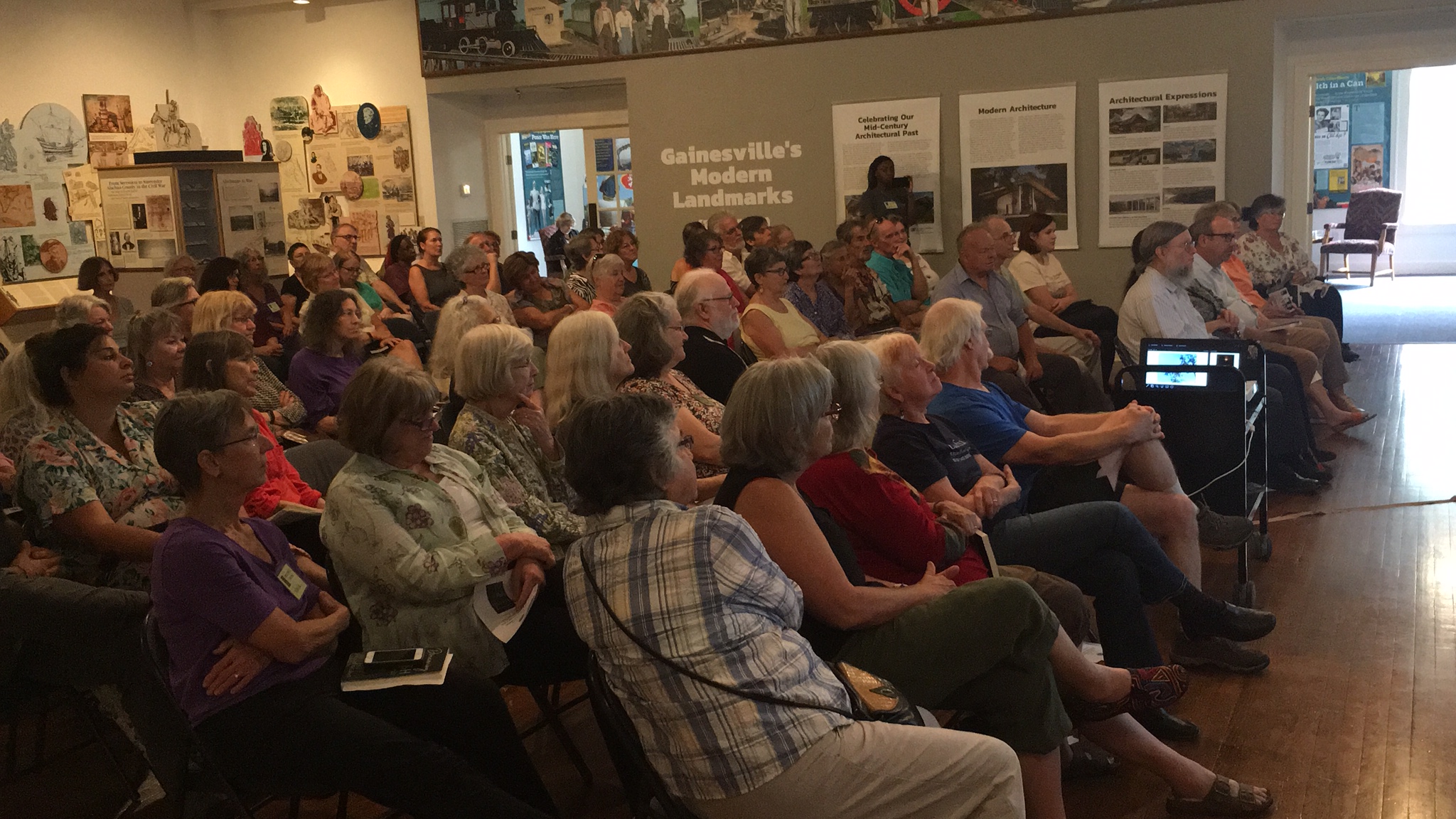
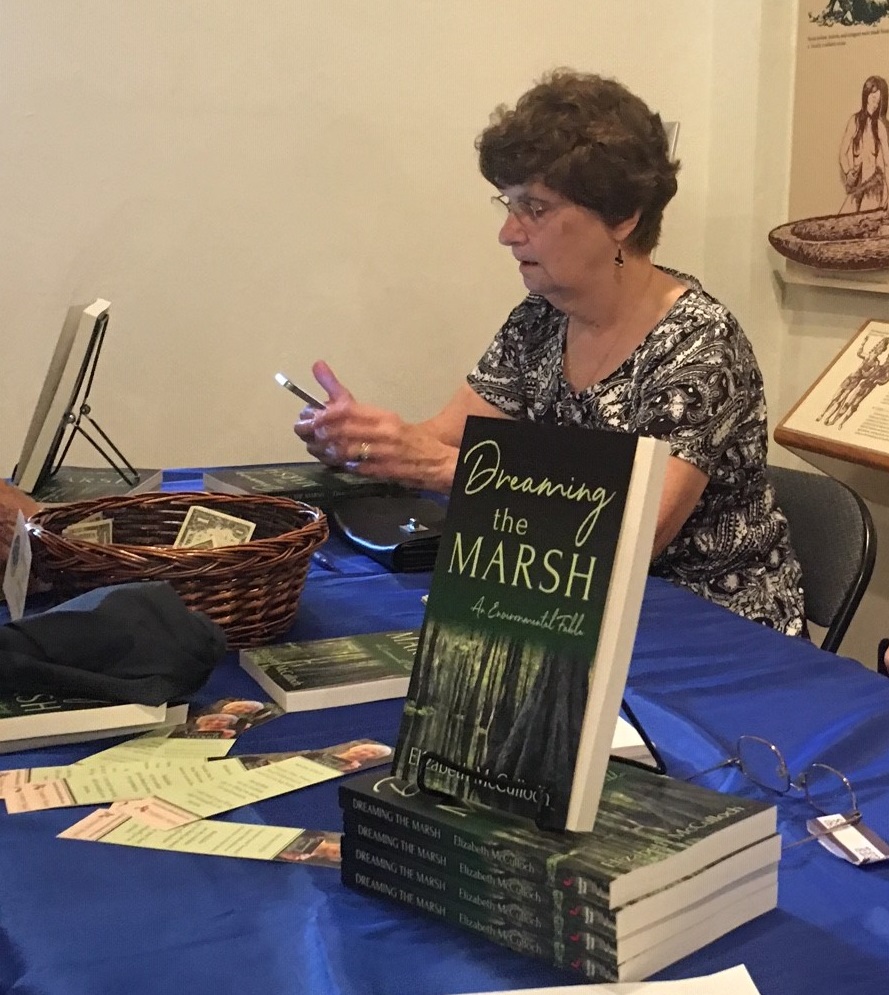
Twisted Road’s Joan sells books
Aside from interviews and blog reviews and word of mouth, I planned to promote my book with presentations at retirement communities. I had contacts at two of these, and arranged to give an hour presentation with a slide show about Payne’s Prairie, which inspired the book.
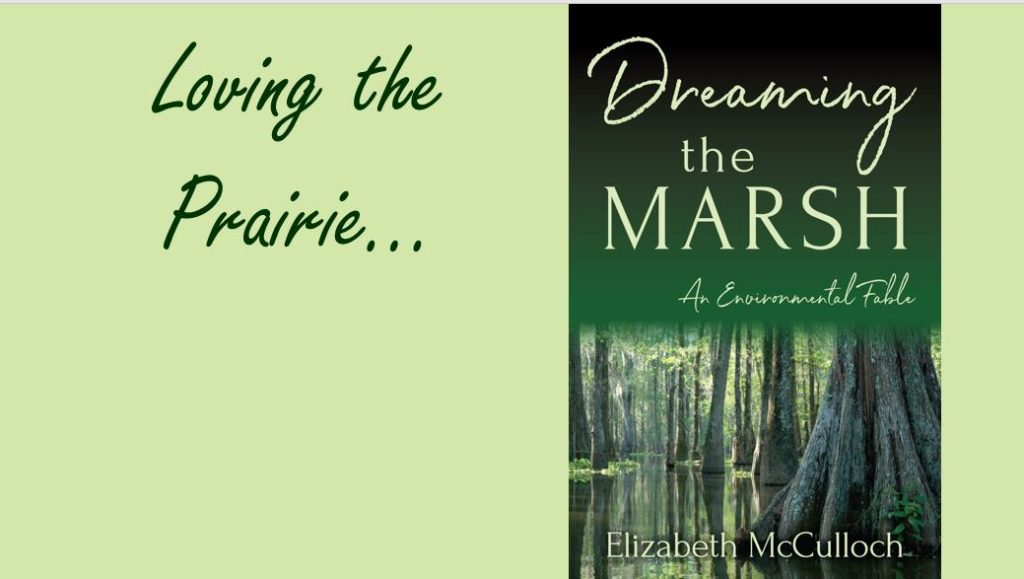
The first slide
It was a lot of fun, and the audiences were large and enthusiastic. I arranged another one in Gainesville, and one in Palm Beach, and I intended to drive around Florida giving my talk. However, I am having second thoughts.
On the one hand, I enjoy it, and I’m spreading the word, which may spread further to residents’ families and friends. I’m providing entertainment, which gratifies the do-gooder in me. On the other hand, at each presentation I only sell a couple of books; few people bring their wallets, though I believe some may later buy on Kindle. My do-gooding has always been aimed at the poor rather than the prosperous, and there are no poor people in these communities. I’m still figuring this out.
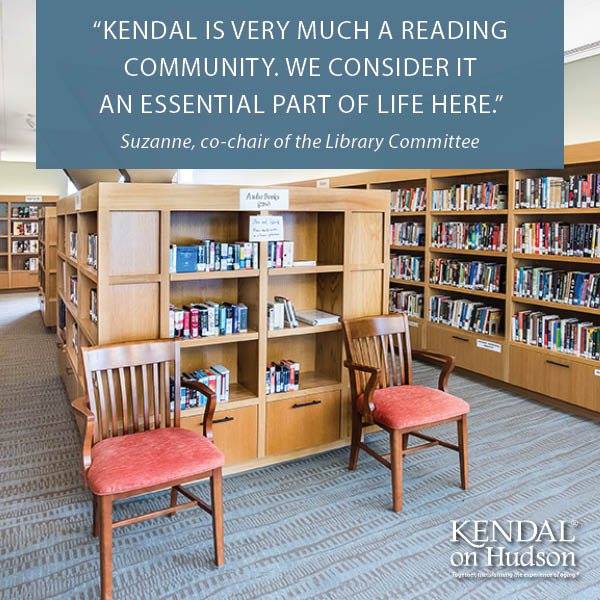
I spoke at a retirement community in Sleepy Hollow, NY
Another target I’ve chosen is book clubs. My publisher gives an extreme discount to book clubs for a purchase of ten or more copies, and I’ve offered to visit in person or virtually. I have visited one book club and have five more lined up. I’ll know more when I’ve done those, but so far it’s way too much fun to forego, regardless of whether it results in sales. A small group of engaged readers who want to talk about my book – what’s not to like? And three of the coming engagements involve wine and food.
Finally, there was the presentation at the Marjorie Kinnan Rawlings homestead at Cross Creek. Mary Anne is a docent there, and she introduced me to Geoff the ranger. Geoff had been wanting to bring writers to the park, since Marjorie wanted it used to nurture writers, and he arranged this as the inaugural event.
I asked Lars Andersen, a kayak and nature guide who wrote Payne’s Prairie, the source of most of my knowledge, to join me. It was a beautiful sunny day, the park volunteers had made cakes, cookies, and roselle tea, the Front Porch Backsteppers (Eli Tragash and Virginia Carr) played fiddle and guitar. Geoff, introducing me, spoke of the long history of writers reading their work when Marjorie lived there, and welcomed me into that group. And Lars described how the ancient people of the Prairie revered the story-tellers who preserved their history, and said I was carrying on that tradition.
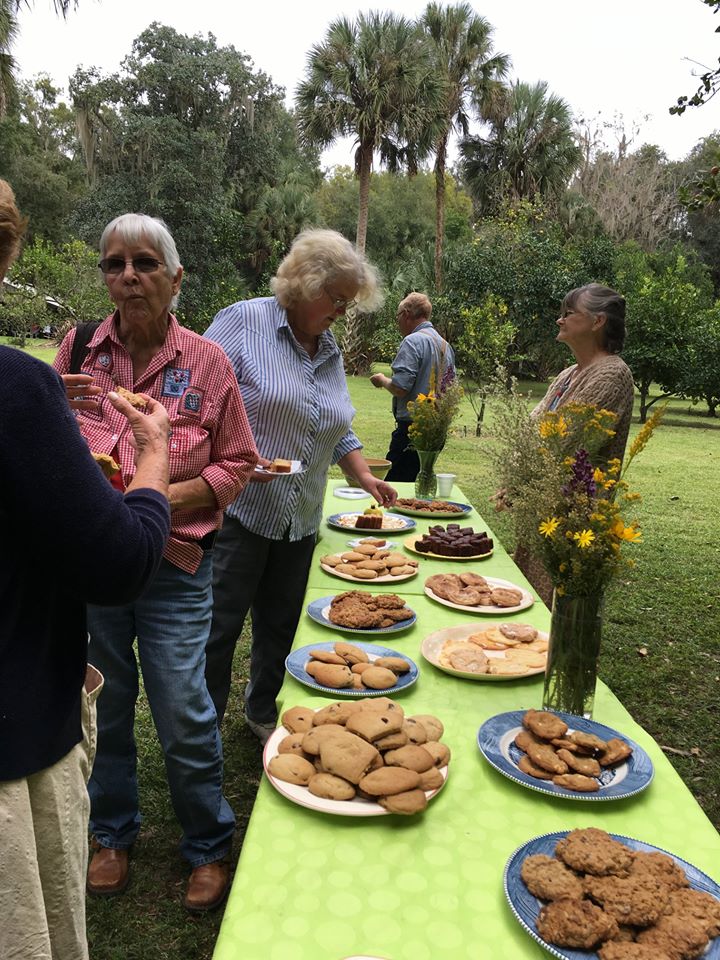
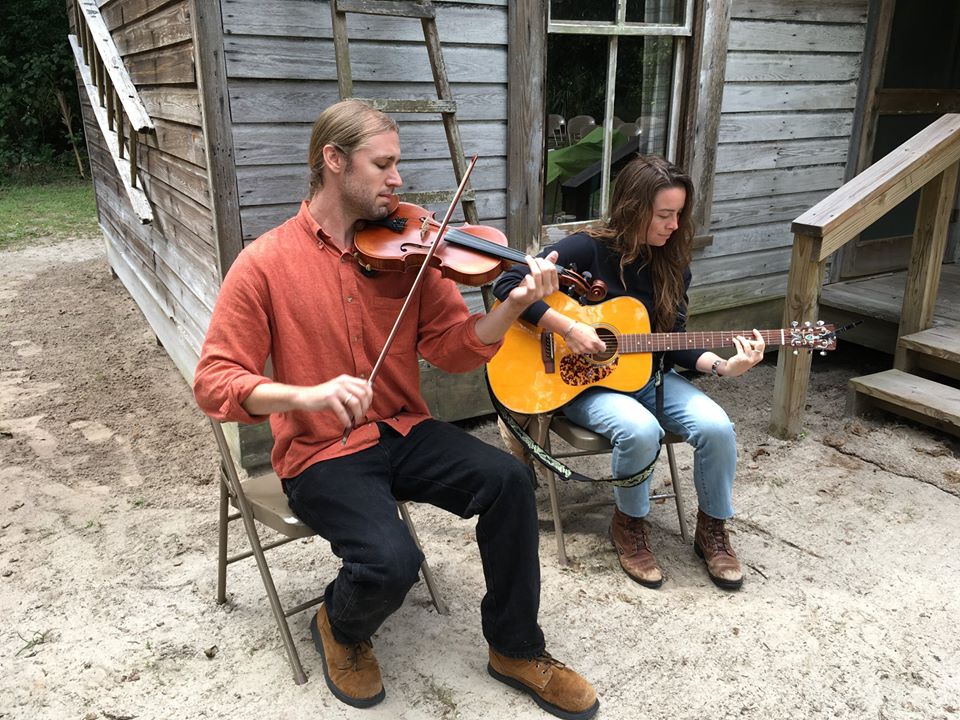
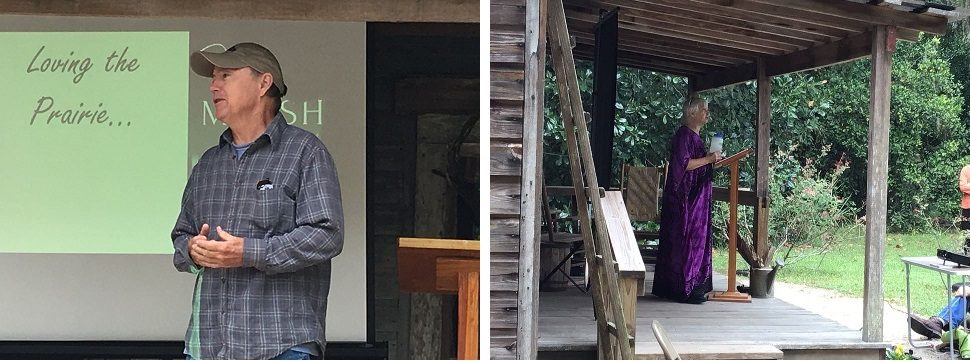
Lars and me
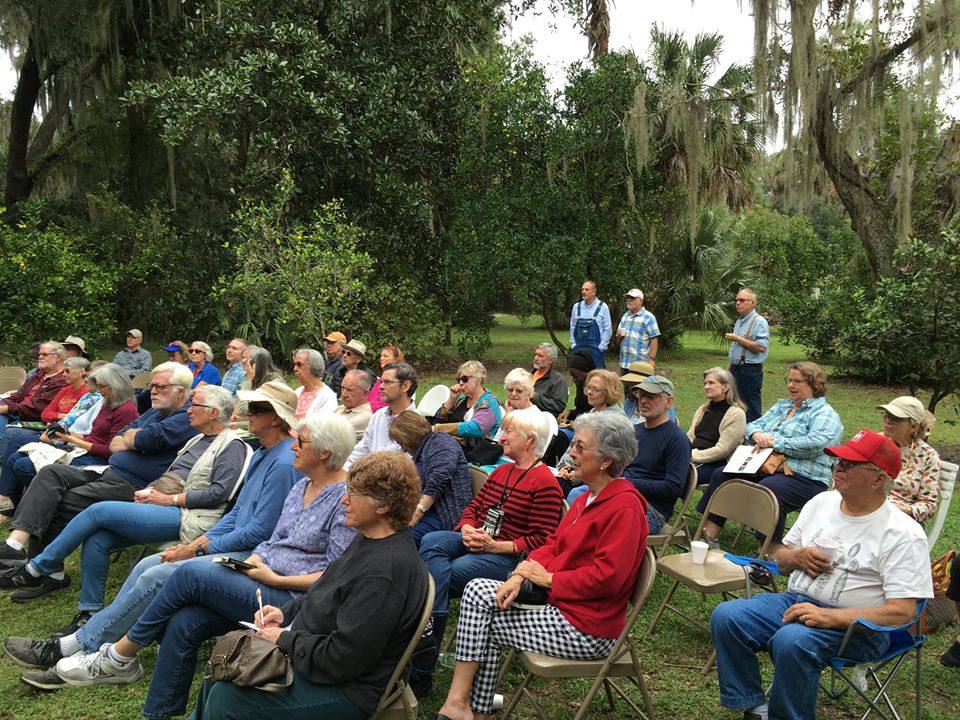
The day after Thanksgiving I went to Paynes Prairie. It was a blue-sky-fluffy-clouds afternoon, with lots of people walking the boardwalk, families visiting from out of town, awed by alligators and birds. I was leaning on the railing watching the limpkins when a family approached and the woman said, “I know you from somewhere.” We stared at each other, trying to figure it out, and then she said, “You’re the author! We heard you at Cross Creek.”
‘You’re the author.’ What lovely words to hear. Yes I am, after all these years. I hoped to get some press for being so old when my first novel was published, but nobody considered that interesting. I‘ve just read that Delia Owens is 70, and has sold 4 million of her debut novel, Where the Crawdads Sing. Whenever I yearn to be a bestseller too, I remember what I wanted through all those years of writing and trying to be published: I wanted people to read and like my book, and they do. I wish there were more of them, and of course I’m aware that I only hear from fans – people don’t go out of their way to call me up and say, “I read your book and I didn’t like it.” But my long dream has come true, and I believe I am happier than I have ever been.
Feb 15, 2019

Since September last year I’ve repeatedly told you that my novel will be published in September this year. “Why does it take a year?” people ask. I thought you might like to know what happens in between signing the contract and the glorious day when the book is born. I’ll tell you the highlights so far. The funny thing is, it’s almost all highlights.
My first joy was joining the Authors Guild. Since nobody agrees on the difference between ‘writer’ and ‘author,’ I’ve got my own: an author is a published writer. My late sister Luli Gray was a member of the Guild, and I would read her monthly newsletters and long for the day when I could join. Until a couple of years ago, only published authors or those with a book contract were eligible. For thirty years or so I’ve been on the outside looking in, nose pressed to the glass, admiring them.

So as soon as I received the proposed contract I joined the Guild, and the first thing I did was ask for their free legal advice. I was astonished by the speed and thoroughness of their legal team. They explained the effect of all the provisions and proposed several changes. For $135 annual membership fee I received what I estimate was about ten hours of expert legal advice.
But wait…there’s more! The Authors Guild has an online members forum, and it was there I began to connect with other authors. I received helpful advice about publicity and working with book clubs. Beyond that, I felt I had found the people who understand what it means to be a writer, who are dealing with the same thrills and disappointments as I.
Of course, there's a fair amount of whining, and an occasional thread filled with severely beaten dead horses. (Writers in the procrastination phase of task achievement like to get caught up in online debates.) But I began to make friends and exchange emails with a few who seemed to share my interests. I’ve bought books by three of them, and reviewed two.

The Authors Guild Community Forum
The long years of trying in vain to be published were often discouraging, but there can be advantages in waiting so long. First, there’s the absolute bliss when the time finally comes. Next, as an old woman, I’ve accumulated a lot of fuel for my imagination. And I admit it: I think I’m wiser than young-uns. (I’m sure they believe they’re wiser than I).
 I'm wiser but they're cuter
I'm wiser but they're cuter
Finally, because I spent most of my adult life earning a good living and a good retirement account, I don’t have to worry about making money. Writing, always a life of penury for most, is becoming even less profitable. According to research by the Codex Group for the Authors Guild., authors' median incomes have dropped 42% since 2009.
Along with that, it’s harder and harder to get one’s book noticed. The internet, streaming media, and goddamsmartphones occupy many minds, while the growth of self-publishing floods the market with books. So authors who can afford it hire publicists, and I can afford it. I gave myself a generous budget to do everything I can to promote this book.
I followed recommendations from writer-friends and people I met on the Author s Guild, and interviewed five publicists. The process was painful for me – I felt everything was riding on the decision, and it cost so much! But finally I settled on a firm that Authors Guild friends had praised in detail, and that firm in turn recommended a website developer.
 Publicist
Publicist

Designer
Now I had a team of three: publisher/editor, publicist, and website designer. To my non-surprise, it was all women. I’ve fallen in love with them all in the course of long phone calls and many emails.
Joan Leggitt at Twisted Road Publications – I knew I had found the editor of my dreams long before she decided to publish my book. When I first submitted it, she told me that magic is fine, but it has to be an integral part of the book. I rewrote the whole thing. My sardonic coffee shop owner became a powerful mystic and visionary; I added more magic and related it to my main characters. I submitted the book again, this time successfully. Then, as we worked together, she suggested one more major change, in the relationship between the twin sisters. I was dubious, but said I’d give it a try. Now I saw that the twins had been cartoon characters. With the revisions, they came to life. I was, and am, awed by Joan’s gifted eye.
Three more edits followed, by Joan and two others, calling for clarifications or pointing out inconsistencies. I had to master the review function in Word, tracking, rejecting, accepting changes. The work was extremely tedious, and brought me to curses and tears, but I was impressed by the editors’ ability to spot tiny important problems. (The last editor presumed to tell me what my characters were thinking and were likely to do, and sometimes wrote new material. I did NOT appreciate that, but she did point out the mysterious disappearance of a biscuit.)

one of many comments
Writing is such a solitary pursuit; like God, we make something from nothing, and we do it alone. Now I had a publisher, who cared about my book as much as I did, and thought about it in the middle of the night.
I had to write a brief bio, dedication, and acknowledgments. The acknowledgments are complicated – I keep acquiring more people to thank – but the dedication was easy – thirty years ago when I finished what I thought was the final draft, I wrote my dedication. I would think of it wistfully from time to time. Now I can’t wait for the day when my dedicatee opens the book and sees that page.
At the same time that I worked on edits, I was responding to requests from Monkey C. Media. I had to think about new things, and answer long questionnaires. Appearance: How about these colors – what about this font? Strategy: What benefit will readers get from it? What action do you want them to take? Write 15 questions and answers for the press kit. Write the About page. We need professional photographs.
More fun, and another woman who is becoming a friend. Adrienne Fletcher, a graduate of the Savannah College of Art and Design, met with me for over an hour at her studio – she wanted to get to know me – and then shot what seemed like hundreds of photos in my backyard about a week later, at the hour of golden light.
Blurbs. Gotta have blurbs. Those are the little quotes from other authors that you see on the back of books: ‘compelling, intelligent and sensitive’ ‘makes Jane Austen look like a piker’ ‘the greatest creative genius since God rested.’
 The Creation image: catholic.org
The Creation image: catholic.org
Authors HATE writing blurbs, or that’s what I’ve heard from more than one. I know very few authors – I had two blurbs promised, but I needed more. That’s why I decided to start reviewing books. I would only review books I was enthusiastic about – there’s not much point in saying “Here’s a book you’ve never heard of and it’s not worth reading.” I didn’t see it as a trade-off (say nice things about me, and I’ll do the same for you) – but as a way to connect with authors. It would be hard to write to a total stranger and ask for a big favor.
This enterprise has only been slightly successful. I received very gracious refusals from several of my hoped-for blurbers, citing deadlines, illness, family troubles. One announced on Facebook shortly before I wrote her that she was no longer doing any blurbs. However, to my delight, I’ve discovered that I love writing reviews. I read more attentively, and I learn a lot by thinking about how other authors do what they do. I’ve decided to start a second blog – Big Books from Small Presses . Like this one, it will link to my website.
I confess I’m a bit worried about the amount of work I’m committing to. I’m working hard 4 or 5 hours in the morning, and often a couple of hours at night. My work with the publicist is about to begin; one of their key responsibilities is assigning me tasks. I didn’t realize when my author life FINALLY began that I was embarking on a full time job. And in this gestation time I’ve only had two days when I could turn to my fourth novel. But when I did, the ideas flowed and the words tumbled out. Now that my book is being published there seems to be a point to it all.
My retirement is over. In the kitchen, in the shower, on a walk, writing ideas or writing business keep popping up. On my magic whiteboard is a long list of things to do. It’s magic because it’s a gift from a Wise Woman – she’s so wise that I simply have to make it upper-case – and I feel her presence in my office as I work on the bed, snuggled by Moe and a blanket, with the whiteboard beside me. I have never been so happy.
 image: A. Jennings (the rubber chicken belonged to my late sister, Luli)
image: A. Jennings (the rubber chicken belonged to my late sister, Luli)







































